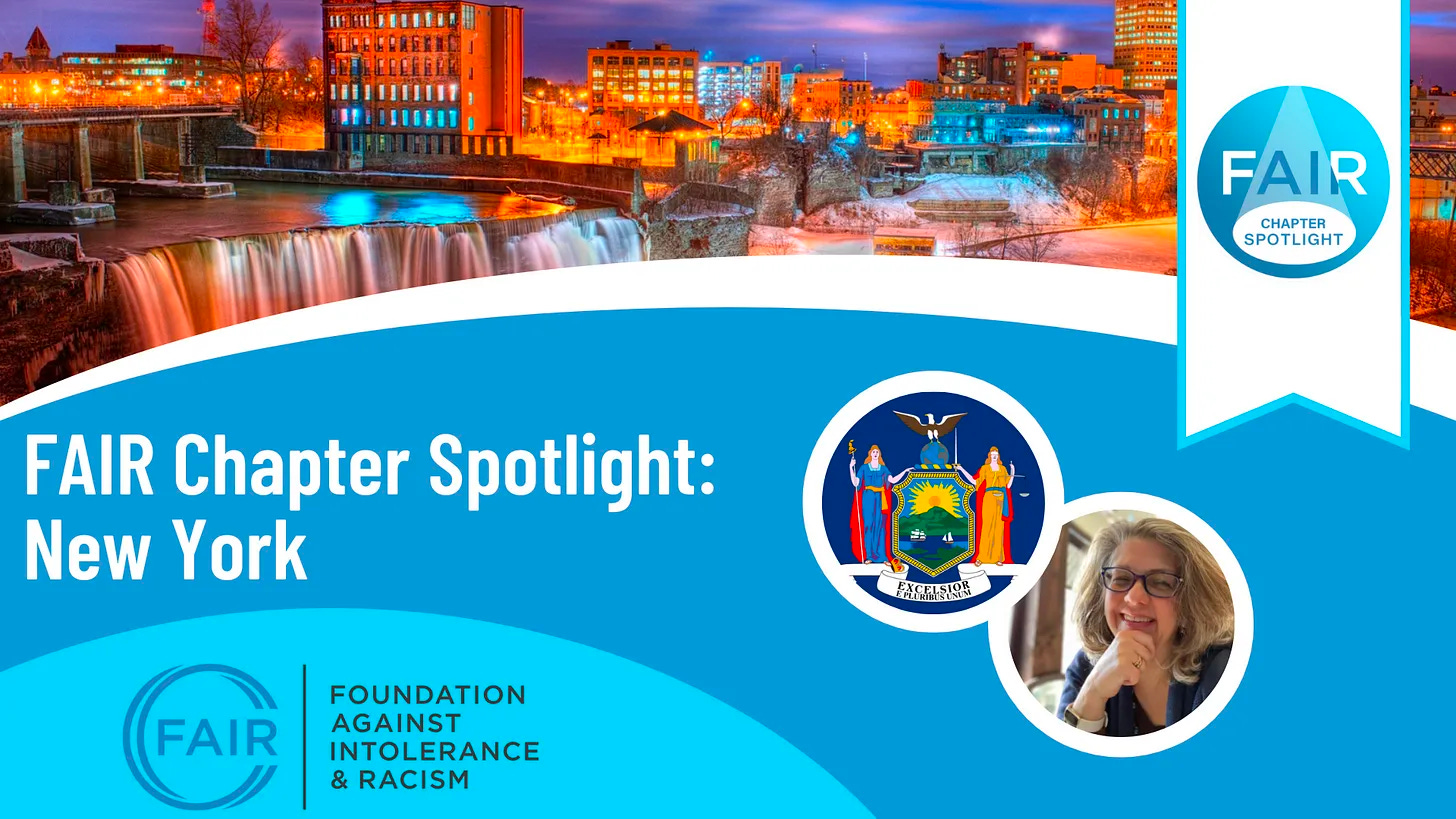FAIR New York: Seeking a Positive, Unifying Narrative
This week on our Substack, FAIR Summer Intern Brooke Hemingway profiles Nancy McDermott, the leader of FAIR’s New York Chapter, who “is no stranger to the debate over educating students about race and racism in America’s past and present.”
“The issue of race is the single most important political problem in the United States,” Nancy says. She doesn’t believe that Americans have become more racist after the 1960s Civil Rights Movement, but is disturbed at the ways “framing everything as an issue of race, and calling oneself an ‘anti-racist’ has become a source for moral authority.” Nancy feels this takes away the complexity of understanding the role that race has played in America’s past, and forces people into a situation where they must choose between two equally distorted positions: that everything in America is racist, or that racism doesn’t exist at all.
Dear Merrick Garland
For her Substack, Broadview, FAIR Advisor Lisa Selin Davis writes to U.S. Attorney General Merrick Garland in response to a letter from the American Academy of Pediatrics, the American Medical Association, and the Children’s Hospital Association, which Davis believes is “part of an intentional campaign of disinformation” because it asserts that recent bomb threats at U.S. hospitals “are rooted in an intentional campaign of disinformation, where a few high-profile users on social media share false and misleading information targeting individual physicians and hospitals.”
I don’t want to spend much time on the “high-profile users on social media,” because those users—likely Matt Walsh and Libs of TikTok—are doing little more than sharing hospitals’ own promotional information. As far as I know, they have not called for violence (please correct me if I’m wrong), but rather for the government to shut down the provision of gender-affirming care, because they are against it, morally and scientifically. Rather than answer to the morals or the science, these organizations are requesting that you censor their critics. In other words, they are engaging the Attorney General to deny free speech.
FAIR in Medicine Director Dr. Carrie Mendoza also sent a letter to A.G. Garland earlier this week, noting the same desire for honest disagreement regarding medical care.
White Privilege
For Free Black Thought, FAIR Advisor Quay Hanna writes about the perils and problems of employing the concept of “white privilege,” and argues that we should instead “focus instead on what universal traits really allow for the freedom to pursue life, liberty, and happiness.”
I believed I could help people think differently about race, but I was certain that “white privilege” would never sell in my community. I’m from a working-class area full of working-class people whose lives had been too difficult to believe that they were the beneficiaries of privilege, especially privilege linked to their skin color. However, since I was still learning about race relations, I wanted to be open to the idea that I was wrong. To be completely honest, though, I felt that even if it were true, ascribing success to some sort of “privilege” would never, ever be accepted by the people in my community.
What Next for New York Charter Schools?
For Education Next, FAIR Advisor Robert Pondiscio writes that “the bipartisanship that ushered in the heyday of the education-reform movement has badly eroded,” which “means diminished political support for charter schools and minimal appetite to thwart the will of the powerful teachers union in deep-blue New York City.” Podiscio writes that this new climate is terrible, most of all, for low-income students.
There was a time, fast receding into memory, when big-city charter schools were media darlings, lionized in movies like Waiting For Superman, and the subject of fawning coverage on 60 Minutes. They were the flagships of a fast-growing education-reform movement, luring the best and brightest new graduates of elite universities away from law schools and investment banks and into Teach For America, and from there to inner-city classrooms aspirationally named Harvard, Princeton, Georgetown, or Michigan instead of Room 222. Tightly run charter schools were celebrated as a rebuke to district-run dropout factories, which had relegated generations of low-income students to second-class citizenship. Charters bristled with do-gooder energy and dubbed themselves “no-excuses” schools, in the belief that the Black-white achievement gap was evidence of low expectations and indifference, not poverty and certainly not race. When students failed, it proved merely that adults had failed them. And there must be no excuses for adult failures. Period.
'We’re not going away': Conservatives build own media ecosystem to fight cancel culture
For USA Today, FAIR Advisor John Wood, Jr. writes that “Conservative America is going its own way. And it has realized that, to a substantial degree, it can.”
As much as they bemoan progressives' zealotry for rooting their political opponents out of institutional and social life, many conservatives have come to embrace the potential that modern technology offers for birthing ecosystems of cultural, social and informational independence.
Social Panic at Sundance
For Quillette, FAIR in the Arts Fellow Michelle Pollino writes about her experience at FAIR’s Los Angeles screening of Jihad Rehab (now titled The Unredacted), and “waited for the problematic scenes that had led to its cancellation.” To her surprise, “those scenes never came.”
It’s ironic that Smaker and her film stand accused of peddling Islamophobia, because the effect of watching The UnRedacted is precisely the opposite. Notwithstanding all of the usual stereotypes I’d internalized, I started to see the men on screen as fully human. There’s no comparison to be made between al-Qaeda’s terroristic plots and the ordinary drug and street crimes that lead most prisoners into US jails, of course. Yet these men still managed to remind me somewhat of my own brothers—struggling to get a decent job, burdened by poor education, living among crime, drugs, and lots of dead ends. Despite all this, they were still trying to learn how to make money, find love, and become responsible parents and family members.
PayPal is no pal to free expression
For FIRE’s Newsdesk, Aaron Terr writes about PayPal’s recent “shutter[ing of] the account of the Free Speech Union, a London-based organization founded by social commentator Toby Young to advocate for free expression,” which is “only the latest in PayPal’s long history of speech-chilling actions against its users.”
PayPal’s greatest hits on free speech also include suspending WikiLeaks’ account after the organization released diplomatic cables and warning an ebook distributor to remove certain works of erotic fiction.
Other absurd actions appear to be a result of PayPal’s reliance on poorly tailored algorithms. For instance, PayPal suspended a user for buying a t-shirt from Isis… the heavy metal band (which formed years before the terrorist group rose to prominence).
A Famine of Common Sense
For her Substack, Slowdown Farmstead, Tara writes that “a famine of common sense and courage can only bring about a glut of cowardice and lunacy,” and that “anything that was thought to be a biological certainty or a moral aspiration is now held up as evidence of bigotry and hateful ignorance.” She offers ways to combat the disenchantment and division this engenders.
None of this has to be an Us vs. Them proposition. Let’s not play into those manufactured dichotomies. The hatred of one thing isn’t required for the love of another. I do not need to malign what’s different when I have confidence and trust in the songs of my heart. Focus on bringing more beauty, more peace, more quiet assuredness into the world. We have enough shouting, grade school bullies. Why feed that monster? Bring it local. Have flesh and blood, face to face conversations that focus on what speaks to your heart over what facts you can trump the other with. Tell your story. Listen to theirs. Be courageous when you’re called to be and trust in your silence when it’s warranted."
How Race Politics Burns Out
For The American Mind, Joel Kotkin writes that while “racial identity politics has become the rage in the media, entertainment, and political worlds… very little attention has focused on what actually works for minorities who have faced harsh treatment in the past.”
No doubt this agenda is working profitably for some, such as writers and administrators in the diversity “industry” and even some black fashion designers. But rhetorical genuflecting and quotas for board seats does little to improve the conditions on the ground for the vast majority of historically disadvantaged groups like African-Americans. As John McWhorter pointed out in the Atlantic, the idea that black progress relies largely on addressing white sinfulness seems an extreme form of “dehumanizing condescension” that robs Blacks, and other minorities, of any agency outside protest or destruction and does little to address the underlying causes of despair.
Building a Progressive Tower of Babel
For Quillette, David Bernstein writes that “the murder of George Floyd on May 25th, 2020 raised the stakes further for anyone in the Jewish community whose work was connected to race and community relations,” and notes that “woke discourse also hurts policy advocacy work by cutting out political moderates who can help pass legislation.”
On a visit to Nashville around this time, I gave a presentation to a local criminal-justice coalition. I asked the attendees directly: “Can people who agree that there are major problems with the criminal-justice system but disagree that America is a white supremacist country have a place at the coalition table?” The answer from the activists was a resounding no. Every single activist said they considered such a profession of belief to be de rigueur. But if the primary goal of the coalition was to reform the system, why should members care a whit about what any other member thought about white supremacy, so long as that person was willing to help advance the shared cause? The activists had become more fixated on their own ideological litmus tests than addressing real world problems.
Inside the Shameful Cancellation of Jihad Rehab
For the National Review, Sebastian Junger details the creation and cancellation of Meg Smaker’s film Jihad Rehab (now titled The Unredacted), debunking the myriad false accusations and dishonest criticisms of the film by a small group of activists.
Many of the women attacking Smaker belonged to a well-connected advocacy group called the “Brown Girls Doc Mafia” (BGDM) and were anything but outliers; the authorship principle had already come to dominate the doc world. Originally a resource for the more prosaic needs of independent filmmakers, the Brown Girls Documentary Mafia has grown to almost 2,000 members — some in prominent positions throughout the industry. The group never attacked Jihad Rehab or acted in any kind of organized way for or against anyone; it simply provides crucial support, resources, and affiliations for filmmakers. But some of its members have very strong views on social justice. An opinion piece co-authored by BGDM member Sonya Childress that ran on the Independent Documentary Association (IDA) website described the entire industry as an essentially racist scam: “an entrenched culture of entitlement and imperialist impulse on the part of filmmakers [seeking] to tell the stories of communities that are not their own, advancing disempowering narratives about marginalized communities — and all for personal gain.”
FAIR strongly opposes mob intimidation and cancellation campaigns. As advocates of free expression, we believe that Meg should be free to share her film—and with FAIR’s support Meg’s story is finally getting out.
To learn more about how you can support Meg and stay updated on when you can see the film for yourself, visit jihadrehab.com and consider donating to Meg’s GoFundMe campaign.
Want to help advance civil rights and liberties for all, and promote a common culture based on fairness, understanding, and humanity? Sign up for a free subscription today!
Join the FAIR Community
Become a FAIR volunteer or to join a FAIR chapter.
Join a Welcome to FAIR Zoom information session to learn more about our mission, or watch a previously recorded session in the Members section of www.fairforall.org.
Take the Pro-Human Pledge and help promote a common culture based on fairness, understanding, and humanity.
Join the FAIR community to connect and share information with other members.
Share your reviews and incident reports on our FAIR Transparency website.
















As a FAIR member, I would like to let members know about my "2026" Substack this week. The topic is "To Translate Slogans, Think Opposites: Euphemisms disguise undesirable results." For tips on how to analyze false narratives, slogans and political bias in the media, follow 2026.substack.com.
Sam Harris did a great podcast with Meg Smaker from The Unredacted film. The full story on her film’s cancellation is harrowing and damning. This is a time to stand up for free speech, more than most.